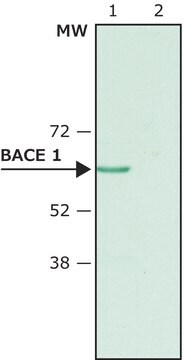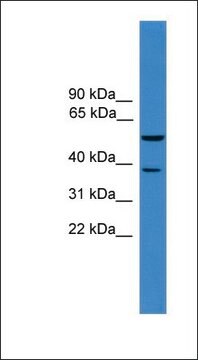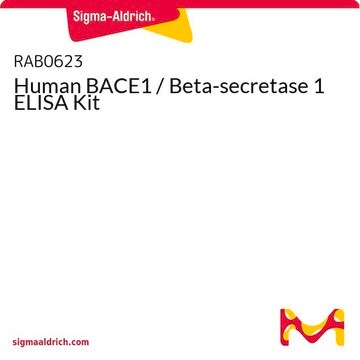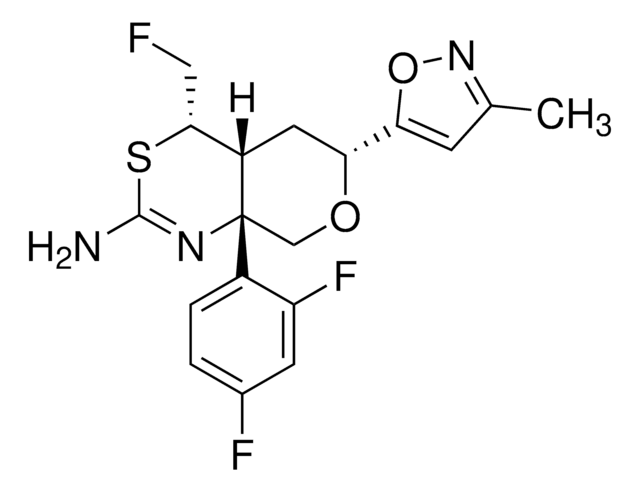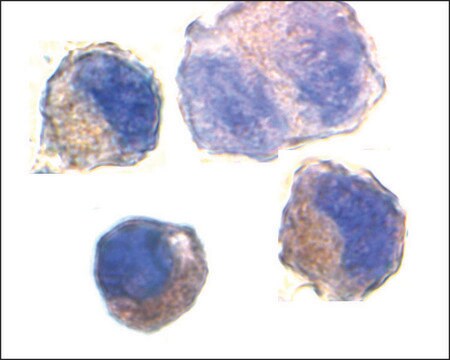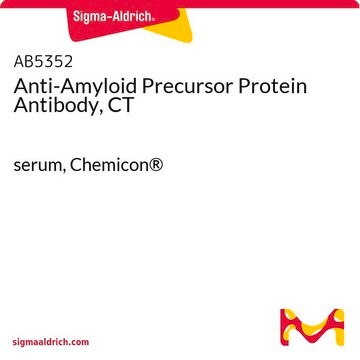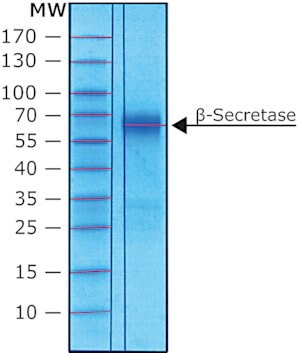SAB2100200
抗BACE1抗体 ウサギ宿主抗体
affinity isolated antibody
別名:
抗β部位APP切断酵素1抗体, 抗ASP2抗体, 抗BACE抗体, 抗FLJ90568抗体, 抗HSPC104抗体
ログイン組織・契約価格を表示する
すべての画像(4)
About This Item
結合体:
unconjugated
application:
IF
IHC
WB
IHC
WB
クローン:
polyclonal
化学種の反応性:
rabbit, bovine, guinea pig, mouse, rat, horse, dog, human
citations:
6
テクニック:
immunofluorescence: suitable
immunohistochemistry: suitable
western blot: suitable
immunohistochemistry: suitable
western blot: suitable
おすすめの製品
由来生物
rabbit
品質水準
結合体
unconjugated
抗体製品の状態
affinity isolated antibody
抗体製品タイプ
primary antibodies
クローン
polyclonal
フォーム
buffered aqueous solution
分子量
51 kDa
化学種の反応性
rabbit, bovine, guinea pig, mouse, rat, horse, dog, human
濃度
0.5 mg - 1 mg/mL
テクニック
immunofluorescence: suitable
immunohistochemistry: suitable
western blot: suitable
UniProtアクセッション番号
輸送温度
wet ice
保管温度
−20°C
ターゲットの翻訳後修飾
unmodified
遺伝子情報
human ... BACE1(23621)
詳細
β-site APP cleaving enzyme (BACE-1) is known as β-secretase. It consists of an N-terminal signal peptide (SP), a pro-peptide (Pro) domain, a catalytic domain, a transmembrane domain and a C-terminal tail.
BACE1, a member of the peptidase A1 protein family, is a type I integral membrane glycoprotein and aspartic protease that is found mainly in the Golgi.
免疫原
Synthetic peptide directed towards the N terminal region of human BACE1
生物化学的/生理学的作用
β-site APP cleaving enzyme (BACE-1) acts as a rate-limiting enzyme of amyloid-β-peptide (Aβ). Overexpression of BACE-1 leads to increased β-secretase activity.
シーケンス
Synthetic peptide located within the following region: GQGYYVEMTVGSPPQTLNILVDTGSSNFAVGAAPHPFLHRYYQRQLSSTY
物理的形状
Purified antibody supplied in 1x PBS buffer with 0.09% (w/v) sodium azide and 2% sucrose.
免責事項
Unless otherwise stated in our catalog or other company documentation accompanying the product(s), our products are intended for research use only and are not to be used for any other purpose, which includes but is not limited to, unauthorized commercial uses, in vitro diagnostic uses, ex vivo or in vivo therapeutic uses or any type of consumption or application to humans or animals.
適切な製品が見つかりませんか。
製品選択ツール.をお試しください
保管分類コード
10 - Combustible liquids
WGK
WGK 3
引火点(°F)
Not applicable
引火点(℃)
Not applicable
適用法令
試験研究用途を考慮した関連法令を主に挙げております。化学物質以外については、一部の情報のみ提供しています。 製品を安全かつ合法的に使用することは、使用者の義務です。最新情報により修正される場合があります。WEBの反映には時間を要することがあるため、適宜SDSをご参照ください。
Jan Code
SAB2100200-50UG:
SAB2100200-100UL:
最新バージョンのいずれかを選択してください:
Proteolytic processing of Neuregulin-1
Willem M
Brain Research Bulletin, 126(5), 178-182 (2016)
pHluorin-BACE1-mCherry Acts as a Reporter for the Intracellular Distribution of Active BACE1 In Vitro and In Vivo
Zhao L, et al.
Cells, 8(5), 474-474 (2019)
beta-Site APP cleaving enzyme up-regulation induced by 4-hydroxynonenal is mediated by stress-activated protein kinases pathways
Tamagno E, et al.
Journal of Neurochemistry, 92(3), 628-636 (2005)
Edward T Parkin et al.
PloS one, 17(1), e0255715-e0255715 (2022-01-14)
The amyloid cascade hypothesis proposes that excessive accumulation of amyloid beta-peptides is the initiating event in Alzheimer's disease. These neurotoxic peptides are generated from the amyloid precursor protein via sequential cleavage by β- and γ-secretases in the 'amyloidogenic' proteolytic pathway.
Chang Qu et al.
Journal of advanced research, 35, 231-243 (2022-01-14)
Honokiol (HO) exerts neuroprotective effects in several animal models of Alzheimer's disease (AD), but the poor dissolution hampers its bioavailability and therapeutic efficacy. A novel honokiol nanoscale drug delivery system (Nano-HO) with smaller size and excellent stability was developed in
ライフサイエンス、有機合成、材料科学、クロマトグラフィー、分析など、あらゆる分野の研究に経験のあるメンバーがおります。.
製品に関するお問い合わせはこちら(テクニカルサービス)